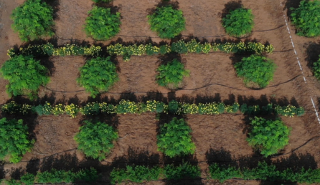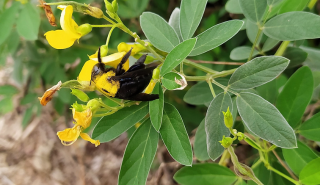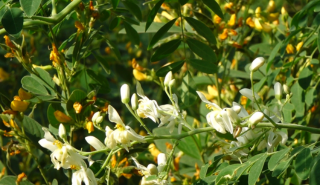Flower power on Indian farms helps bees, boosts livelihoods
28 November 2023
 Planting flowers beside food crops on farms in India attracts bees, boosts pollination and improves crop yield and quality, researchers have found.
Planting flowers beside food crops on farms in India attracts bees, boosts pollination and improves crop yield and quality, researchers have found.
The research, the first Indian study of its kind, is published today (Monday, 28 November) in the Journal of Applied Ecology and was carried out in South India by ecologists from the University of Reading, UK, and the M S Swaminathan Research Foundation, India.
The scientists focused on the Moringa crop, a nutrient-rich "superfood," and its essential pollinators – bees.
By planting companion marigold flowers and red gram crops alongside Moringa trees in orchards, the research team increased the abundance and diversity of flower-visiting insects, ultimately improving pollination and boosting crop yield.

Dr Deepa Senapathi, of the University of Reading, said: “Planting wildflowers on agricultural land is a tried and tested method seen in many arable fields and orchards in the UK and across Europe. This farming technique is known to boost insect pollinator numbers.
“We worked with farmers in South India to design the best co-flowering crops and boost the numbers of native bees and other insect pollinators visiting the moringa orchards.”
Rich results
The research team worked with smallholder farmers in the Kannivadi region of Tamil Nadu in India in 24 moringa orchards. They helped them plant red gram and marigold flowers in 12 orchards while the other 12 had no co-flowering crops planted in them.
Flower visitor numbers and diversity were 50% and 33% higher in sites with red gram and marigold flowers compared to those without. Sites with higher numbers of flower visiting insects also showed better quality of crops, with bigger moringa pods. The sites with red gram and marigold flowers which had previously suffered from a lack of pollination saw higher yields. Numbers of harvestable moringa fruits increased by 30% in the orchards with co-flowering crops, compared to those without.
“Greater yields and higher quality fruit will translate to a healthier and better food supply for smallholder communities. The farming communities can also use the red gram as a protein source in their diets and receive extra income from selling the marigold flowers.”
Sustainable goal
The study was produced as part of the TROPICAL project, led by the University of Reading team using UKRI funding from the Global Challenges Research Fund to investigate how research evidence from the UK could be used in tropical landscapes where pollinator dependent crops are grown.

India has many crops of high economic and nutritional value, such as mango and moringa, where there is potential to significantly increase and improve crop pollination services. Intensive farming practices, using large amounts of chemical pesticides and fertilisers, and loss of natural habitats have negatively impacted biodiversity in India, including native bees and other pollinators.
Smallholder farmers in the tropics, whose crops depend on native pollinators, are particularly vulnerable to these impacts. The results of the study shows how farmers can boost yields while also managing their lands in a more sustainable manner.
Dhandapani, S., Pakkirisamy, M., Rajaraman, R., Garratt, M. P. D., Potts, S. G., Raj, R., Subramanian, M., & Senapathi, D. (2023). Floral interventions enhance flower visitor communities and pollination services in moringa plantations. Journal of Applied Ecology, 00, 1–13. https://doi.org/10.1111/1365-2664.14532

